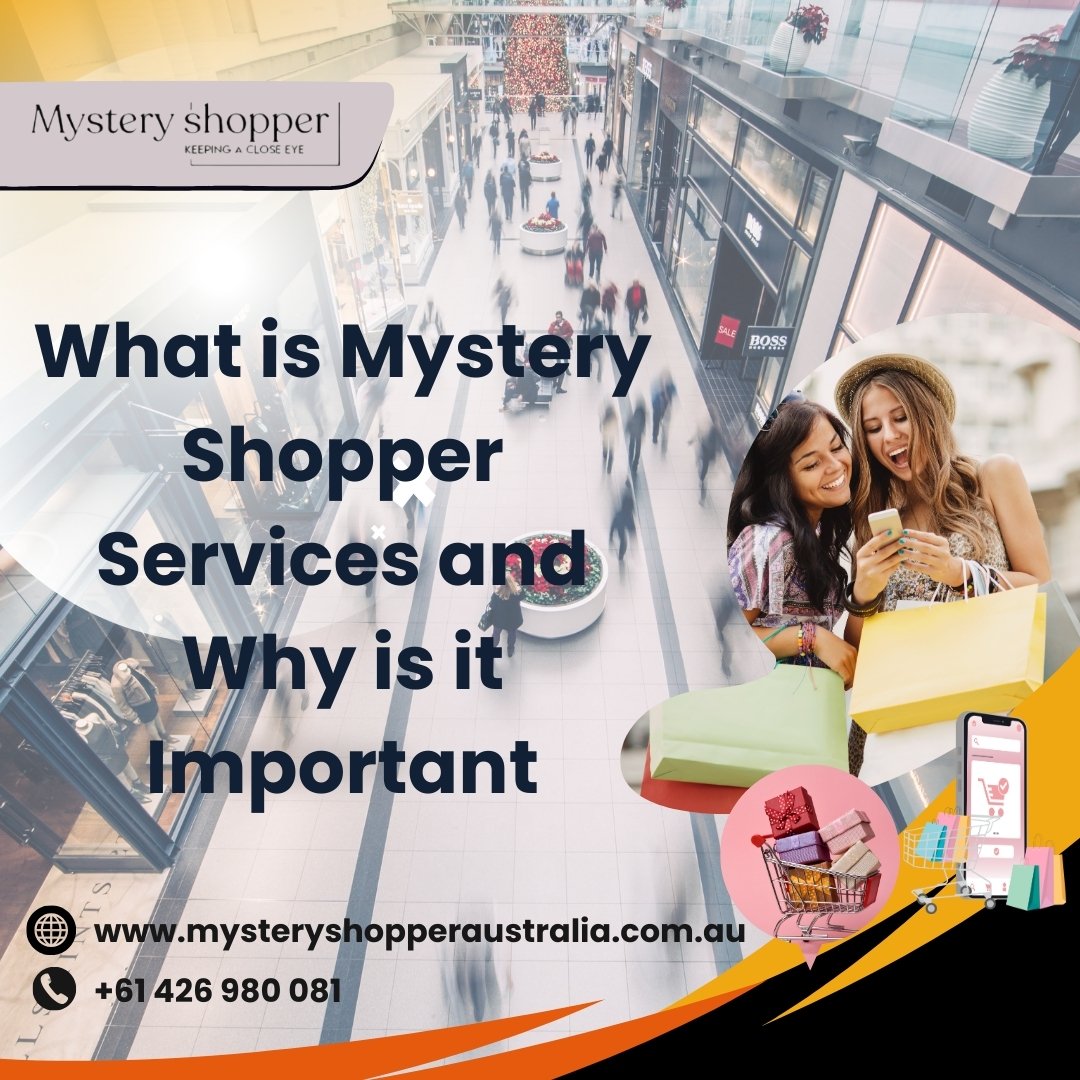In today’s competitive retail landscape, understanding your customer is invaluable. That’s where mystery shoppers come in. These undercover evaluators serve as the unsung heroes of market research. Their mission? To provide businesses with firsthand insights into the customer experience. By posing as ordinary shoppers, they help companies identify strengths and weaknesses inside their stores, paving the way for improved services and operational practices.
Customer experience has never been more critical. In an age where consumer expectations are soaring, every interaction holds potential for impact—positive or negative. Retailers must adapt swiftly to meet these demands and foster loyalty. Fortunately, mystery shopping offers a unique lens through which businesses can glimpse their performance from a customer’s perspective. As we delve deeper into this powerful tool used by countless organizations in Victoria, we’ll uncover how mystery shoppers transform the retail environment into a thriving hub for exceptional service and satisfaction. Join us on this journey to explore effective strategies that can enhance your business’s approach to customer engagement and retention!
What Are Mystery Shoppers?
Mystery shopping is an innovative market research tool that allows companies to gather valuable insights about their service quality and customer experience. The fundamental concept is simple: organizations employ individuals, known as mystery shoppers, to evaluate various aspects of their business discreetly. These professionals pose as ordinary customers and assess the level of service they receive, providing unbiased feedback that can help businesses understand their strengths and weaknesses from a consumer’s perspective.
The purpose behind mystery shopping extends beyond mere evaluations; it aims to enhance overall customer satisfaction and improve operational performance. By employing mystery shoppers, companies can identify specific areas needing improvement, whether it’s staff behavior, product knowledge, or even cleanliness within brick-and-mortar stores. For instance, a retail clothing store might ask mystery shoppers to explore how knowledgeable employees are on current trends and promotions. This type of evaluation not only provides direct insight into employee interactions but also lends itself to recommendations that generate top-notch customer experiences.
The process of conducting mystery shopping involves several steps starting with recruitment. Companies often collaborate with specialized firms that maintain a pool of trained shoppers ready for assignments. Once selected for an assignment, a mystery shopper receives detailed instructions outlining what aspects they should focus on during their visits or online transactions. Evaluation criteria may include adherence to company policies, promptness in response times for inquiries, and the overall atmosphere created by staff members during interactions.
After completing their missions, mystery shoppers submit comprehensive reports detailing their experiences along with any photographs or documentation supporting their findings. This information is invaluable for businesses seeking to adapt their strategies based on real-world customer interactions. In Victoria (VIC), organizations can leverage this method not just for compliance or standards monitoring but as a strategic part of ongoing improvements—ensuring they consistently meet local demands while fostering a culture focused on excellent service delivery.
The Role of Mystery Shoppers in VIC
In Victoria, mystery shoppers play a vital role in enhancing business operations and shaping customer experiences across various sectors. Their primary function goes beyond simply evaluating service quality; they act as the eyes and ears of retailers and service providers. By posing as ordinary customers, these evaluators assess everything from staff behavior to store cleanliness and product availability. For instance, a café owner might enlist mystery shoppers to gauge staff friendliness during peak hours—an essential insight for improving customer interaction during busy periods.
Moreover, mystery shoppers provide valuable insights into local consumer behaviors and preferences that can greatly influence business strategies. In a culturally diverse region like Victoria, understanding the unique needs of different demographics is crucial. A fashion retailer may discover through detailed shopper feedback that certain styles appeal more to specific communities, prompting them to tailor their inventory accordingly. This targeted approach not only enhances customer satisfaction but also boosts sales by aligning products with local tastes.
Additionally, mystery shopping reveals opportunities for improvement that may otherwise go unnoticed by management. For example, if multiple evaluations suggest inconsistent messaging between in-store promotions and digital marketing efforts, businesses can synchronize their branding strategies for a cohesive customer experience. Furthermore, insights gathered can help identify operational pain points—such as long wait times at checkout—which can be addressed to streamline processes effectively.
Ultimately, the role of mystery shoppers in VIC transcends mere evaluation; they serve as strategic partners that empower businesses with actionable data about their customers’ experiences and expectations. By continuously adapting based on these findings, companies can foster loyalty among their clientele while ensuring they remain competitive in an ever-evolving marketplace.
Benefits for Companies in VIC
Mystery shopping is more than just a buzzword; it represents a transformative tool that offers numerous benefits to companies operating in the vibrant retail landscape of Victoria (VIC). One of the primary advantages is the enhancement of customer service strategies. By relying on detailed feedback from mystery shoppers, businesses can identify strengths and weaknesses in their customer interaction processes. For instance, a café chain might discover through mystery shopper reports that their staff is friendly but untrained in upselling techniques. This insight allows owners to implement targeted training programs, leading to an enriched customer experience that keeps patrons returning while also increasing sales.
Operational efficiency also sees significant improvement through meticulous evaluations conducted by mystery shoppers. These evaluators not only assess customer interactions but also observe operational workflows and product presentation in-store. Take, for example, a retail clothing store struggling with checkout line delays during peak hours. Mystery shopping evaluations may reveal that additional staffing at key times could streamline operations. Acting on such insights helps businesses become more efficient internally, ultimately leading to faster service and improved customer satisfaction.
Furthermore, companies that engage in regular mystery shopping assessments gain a unique competitive advantage within the VIC marketplace. By staying attuned to consumer preferences and local market trends, these businesses can refine their offerings and adapt quickly to changing demands. For instance, a brewery using mystery shoppers might uncover preferences for certain seasonal beers among customers in different suburbs. With this knowledge at hand, they can tailor their marketing strategies and seasonal releases effectively to enhance engagement. Regular assessments equip businesses with actionable data necessary for making informed decisions that keep them ahead of competitors in an ever-evolving retail environment.
In conclusion, investing in mystery shopping initiatives pays dividends not only through enhanced customer service practices but also by streamlining operations and securing competitive advantages tailored to the unique VIC market landscape. Companies willing to embrace this strategic approach are positioning themselves for sustainable growth and heightened customer loyalty as they continue unlocking new secrets about their business dynamics.
Types of Mystery Shopping Assignments
Mystery shopping assignments can take various forms, each tailored to uncover specific insights that help businesses enhance their operations and customer experience. One common approach is in-store evaluations, where mystery shoppers visit retail locations disguised as ordinary customers. Their primary focus is on gauging staff interaction—whether employees are friendly, knowledgeable, and attentive—and the presentation of products. For instance, a shopper might rate how clearly items are displayed or if promotional materials are effectively placed. This kind of assessment is crucial for brick-and-mortar retailers in Victoria looking to improve the quality of service they provide and ultimately drive sales.
In addition to in-store evaluations, online shopping experiences have become increasingly vital as e-commerce continues to grow. Mystery shoppers conduct these evaluations by navigating a company’s website as if they were genuine customers. They assess everything from the ease of finding products to the checkout process’s clarity and efficiency. For example, a mystery shopper may discover that certain critical information—such as delivery times or return policies—is buried within multiple links, suggesting potential obstacles for real customers. Addressing these issues improves conversion rates and ensures a smoother shopping experience.
Phone inquiries represent another integral type of mystery shopping assignment. Here, evaluators call customer service lines posing as potential clients seeking answers or assistance with products or services. They evaluate responsiveness, professionalism, and problem-solving ability over the phone. Imagine a scenario where a bussing company offering tours around Victoria receives feedback from a mystery shopper who notes that their wait time was excessive or that they received insufficient information about tour options. Such insights can lead organizations to refine staff training programs and improve overall communication strategies.
By employing various types of mystery shopping assignments—be it scrutinizing in-store interactions, assessing online usability, or simulating customer inquiries—businesses in Victoria gain comprehensive feedback across multiple touchpoints in the customer journey. This multifaceted approach allows them not only to identify areas needing improvement but also to reinforce best practices among teams dedicated to enhancing customer satisfaction.
Choosing the Right Mystery Shopping Program
Selecting the right mystery shopping program is a pivotal decision for any business owner seeking to enhance their customer experience and operational efficiency. One of the key factors to consider is the alignment of the mystery shopping objectives with the specific goals of your business. For instance, if you’re a retail outlet looking to improve overall customer service, your chosen program should focus on interactions between staff and customers. In contrast, if your emphasis is on product presentation or store layout, then programs that provide detailed evaluations of these elements will be more beneficial.
Customization plays an equally critical role in ensuring that a mystery shopping program meets your unique needs. Generic assessments may miss nuances vital to your particular sector or brand identity, leading to ambiguous insights. A restaurant chain in Melbourne can benefit significantly from tailored evaluations focusing on food quality and dining ambiance rather than generic service metrics alone. By crafting a bespoke approach that zeroes in on crucial performance indicators relevant to your industry, businesses can receive actionable feedback that truly drives improvement.
In addition, it’s important for business owners to evaluate the qualifications and experience level of the mystery shoppers themselves. Working with experienced evaluators familiar with specific market dynamics often results in richer feedback. Companies like those in Victoria’s tourism sector might find immense value in hiring mystery shoppers who understand local culture and consumer behavior trends, enabling them to gain deeper insights into visitor experiences compared to general shopper profiles.
Finally, consider how findings from these evaluations will be communicated and acted upon within your organization. The best programs not only deliver reports but also offer strategic recommendations based on findings—thus turning data into meaningful strategies that affect real change in customer engagement and satisfaction levels. Investing time upfront in selecting a suitable mystery shopping program ensures businesses are equipped with tools designed for measurable success in today’s competitive landscape.
Common Challenges Faced by Businesses Using Mystery Shoppers
Despite the significant advantages mystery shopping offers, many businesses in Victoria encounter challenges that can hinder the effectiveness of these programs. One prevalent issue is the misalignment between what companies expect to gain from mystery shopping and the actual findings reported by shoppers. For instance, a retailer might seek feedback specifically on product availability and staff knowledge, but instead receive insights focused more on customer engagement or store ambiance. This disconnect can lead to confusion about prioritizing areas for improvement and ultimately result in a lack of actionable steps.
Another challenge that firms face revolves around potential bias in evaluator effectiveness. Mystery shoppers are often individuals recruited for their ability to assess specific aspects of customer service and retail operations, but inherent biases can influence their judgments. For example, a shopper who has worked in retail may subconsciously have higher expectations based on their experiences, which could skew their evaluations negatively against employees who might not meet those benchmarks. Conversely, enthusiastic shoppers with less industry experience might overlook significant issues because they are overly impressed by personable interactions without considering operational standards.
To mitigate these challenges, businesses must establish clear objectives before implementing mystery shopping initiatives and communicate them effectively to the evaluators. Creating standardized evaluation criteria that align with company goals can help ensure that feedback is relevant and usable. Moreover, investing time in training those involved in recruiting mystery shoppers—or choosing seasoned professionals who understand your business’s unique context—can significantly reduce data inconsistencies caused by subjective biases.
Ultimately, while there will always be hurdles when integrating mystery shopping into business strategies, recognizing these common problems can empower Victorian companies to foster more effective partnerships with evaluation services. By addressing expectations upfront and ensuring a balanced representation among mystery shoppers, businesses can glean clearer insights that drive meaningful improvements in customer service and overall operations.
Real-Life Success Stories from VIC Businesses
Mystery shopping has proven to be a game-changer for numerous businesses in Victoria, delivering valuable insights that lead to significant enhancements in service and customer satisfaction. One notable case is a popular café chain that struggled with long wait times and inconsistent staff interactions across its locations. By employing mystery shoppers to evaluate their customer service, the chain identified specific pain points within the workflow and employee training processes. As a result, management implemented targeted training programs focused on efficiency and interpersonal skills, leading to improved turnaround times and higher customer satisfaction ratings.
Another compelling example comes from a retail store specializing in sports equipment. Prior to engaging mystery shoppers, they had noticed stagnant sales despite launching new product lines. Upon conducting the shopping exercise, the evaluators provided detailed feedback about inadequate product knowledge among staff members and uninspiring in-store displays. By acting on this input—revamping store layouts for more effective merchandising and enhancing training for their employees—the company saw a remarkable 25% increase in sales within just three months following these changes.
Testimonials also highlight the benefits of mystery shopping initiatives; one local boutique owner noted how regular evaluations have transformed her business environment. She explained that before integrating mystery shopper reports into performance reviews, it was challenging to gauge employee strengths and weaknesses accurately. Post-implementation, her staff received constructive feedback that fostered motivation and personal development while also boosting overall team morale. This kind of transformation not only enhanced customer experiences but also cultivated a more engaged workforce.
Ultimately, these success stories illustrate how strategic implementation of mystery shopping can yield rippling effects on operational excellence within Victorian businesses. By leveraging target-specific insights gained from mystery shoppers, companies can refine procedures, empower teams, and ultimately create memorable experiences that resonate with customers long after their visit. These real-life examples showcase the transformative power of understanding consumer behavior at its core—a necessity in today’s competitive market landscape.
Future Trends in Mystery Shopping
As the landscape of retail continues to evolve, so too does the method of gathering and interpreting consumer insights. One of the most intriguing advancements shaping the future of mystery shopping is the growing integration of artificial intelligence (AI). This technological evolution allows for faster data collection, more accurate reports, and predictive analytics that can provide businesses with actionable insights. AI-driven platforms can analyze customer interactions at scale, identifying patterns in behavior and preferences that were previously difficult to discern manually. For instance, a local café chain in Victoria could use AI-enhanced mystery shopping evaluations to predict which menu items are likely to succeed based on past feedback trends.
Moreover, as customer service expectations grow increasingly sophisticated, mystery shopping will need to adapt its offerings to reflect those changes. Businesses are moving toward a more holistic understanding of customer experiences that extends beyond traditional evaluations. Companies might implement video assessments or utilize virtual reality scenarios where mystery shoppers simulate various purchasing experiences across multiple channels—be it online, in-store, or via phone communications. This immersive approach can lend invaluable clarity about how different environments influence consumer choices and perceptions.
Another key trend is an increased emphasis on personalization within mystery shopping assignments. With consumers expecting tailored interactions from brands they frequent, businesses should seek out customizable mystery shopping programs designed to address specific objectives pertinent to their unique market contexts. For example, a high-end boutique may aim to ensure their staff exudes elegance and expertise during customer engagements; thus, bespoke evaluation criteria would focus heavily on those elements rather than generic performance indicators.
In conclusion, as technology progresses and consumer tastes continue shifting towards personalized experiences, mystery shopping will become an even more dynamic tool for businesses looking to gain critical insights into their operations. By embracing these advancements and trends—including AI integration and comprehensive evaluation methodologies—businesses in Victoria can better navigate changing consumer landscapes while fortifying their competitive edge in an ever-evolving marketplace.
Embracing the Mystery for Business Success
In conclusion, mystery shoppers offer invaluable insights that can significantly enhance businesses in Victoria. They uncover the hidden factors that affect customer experiences and operational efficiency. By providing objective evaluations, these shoppers help companies understand what works well and what needs improvement. This information is crucial for developing effective strategies and staying competitive in today’s market.
For business owners and managers in VIC, the time to integrate mystery shopping into your operations is now. Take advantage of this powerful tool to gain a deeper understanding of your customers’ needs and preferences. Embrace the mysteries waiting to be unlocked, and propel your business towards growth and excellence.






